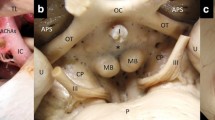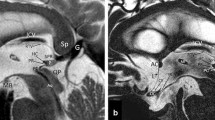Abstract
Purpose
The circumventricular organs (CVOs) occupy seven midline locations around the ventricles. They contain specialized ependymal cells called tanycytes and have an incomplete blood–brain barrier (BBB). We hypothesized that appearances of the lesser known CVOs on contrast-enhanced MRI might lead to confusion in image interpretation whereby they might be mistaken for pathology-related abnormal contrast enhancement. We therefore assessed the normal appearances and prevalence of contrast enhancement of the CVOs on routine clinical brain MRI and reviewed the functional anatomy of the CVOs.
Methods
We retrospectively reviewed sagittal and coronal pre- and post-contrast T1-weighted brain 3T MR images in 100 adult patients with normal findings. We assessed the presence of the median eminence (ME), neurohypophysis (NH), pineal gland (PG), subforniceal organ (SFO), organum vasculosum of the lamina terminalis (OVLT), subcommissural organ (SCO), and the area postrema (AP).
Results
The frequency of contrast enhancement of the seven CVOs was as follows: ME in 100 %, NH in 96 %, PG in 84 %, SFO in 1 %, OVLT in 34 %, SCO in 0 %, and AP in 2 %.
Conclusions
The main CVOs (ME, NH, and PG) are well known and appreciated on brain imaging. However, there is a little awareness of the minor CVOs among neuroimagers. This is the first study of contrast enhancement prevalence of the SF, OV, SC, and AP on brain MRI. All the latter are small, faint, rarely visualized, and therefore not likely to cause misinterpretation with significant sources of pathology that cause breakdown of the BBB, such as tumor or inflammation.






Similar content being viewed by others
References
Altman DG (1991) Mathematics for kappa. In: Altman DG (ed) Practical statistics for medical research, 1st edn. Chapman & Hall, London, pp 406–407
Benarroch EE (2011) Circumventricular organs: receptive and homeostatic functions and clinical implications. Neurology 77:1198–1204
Bennett L, Yang M, Enikolopov G, Iacovitti L (2009) Circumventricular organs: a novel site of neural stem cells in the adult brain. Mol Cell Neurosci 41:337–347
Bradley WG Jr (2008) Pros and cons of 3 tesla MRI. J Am Coll Radiol 5:871–878
Cicchetti DV, Feinstein AR (1990) High agreement but low kappa: II. Resolving the paradoxes. J Clin Epidemiol 6:551–558
Duvernoy H, Risold P (2007) The circumventricular organs: an atlas of comparative anatomy and vascularization. Brain Res Rev 56:119–147
Feinstein AR, Cicchetti DV (1990) High agreement but low kappa: I. The problems of two paradoxes. J Clin Epidemiol 6:543–549
Fry M, Ferguson AV (2007) The sensory circumventricular organs: brain targets for circulating signals controlling ingestive behavior. Physiol Behav 91:413–423
Ganong WF (2000) Circumventricular organs: definition and role in the regulation of endocrine and autonomic function. Clin Exp Pharmacol Physiol 27:422–427
Hoyda TD, Smith PM, Ferguson AV (2009) Gastrointestinal hormone actions in the central regulation of energy metabolism: potential sensory roles for the circumventricular organs. Int J Obes (Lond) 33(Suppl 1):S16–S21
Inoue Y, Saiwai S, Miyamoto T, Katsuyama J (1994) Enhanced high-resolution sagittal MRI of normal pineal glands. J Comput Assist Tomogr 18:182–186
Johanson CE (2008) Choroid plexus-cerebrospinal fluid circulatory dynamics: impact on brain growth, metabolism, and repair. In: Conn PM (ed) Neuroscience in medicine, 3rd edn. Humana Press, Totowa, pp 181–184
Joly JS, Osório J, Alunni A, Auger H, Kano S, Rétaux S (2007) Windows of the brain: towards a developmental biology of circumventricular and other neurohemal organs. Semin Cell Dev Biol 18:512–524
Kubo S, Inui T, Yamazato K (2004) Visualisation of the circumventricular organs by fluorescence endoscopy. J Neurol Neurosurg Psychiatry 75:180
Landas S, Fischer J, Wilkin L et al (1985) Demonstration of regional blood-brain barrier permeability in human brain. Neurosci Lett 57:251–256
Landis JR, Koch GG (1977) The measurement of observer agreement for categorical data. Biometrics 33:159–174
Lawlor D, Stone T (2001) Public health and data protection: an inevitable collision or potential for a meeting of minds? Int J Epidemiol 30:1221–1225
Macchi V, Porzionato A, Belloni AS, Stecco C, Parenti A, De Caro R (2006) Immunohistochemical mapping of adrenomedullin in the human medulla oblongata. Peptides 27:1397–1404
McKinley MJ, McAllen RM, Davern P, Giles ME, Penschow J, Sunn N, Uschakov A, Oldfield BJ (2003) The sensory circumventricular organs of the mammalian brain. Adv Anat Embryol Cell Biol 172:III–XII, 1–122
Mori F, Pérez-Torres S, De Caro R, Porzionato A, Macchi V, Beleta J, Gavaldà A, Palacios JM, Mengod G (2010) The human area postrema and other nuclei related to the emetic reflex express cAMP phosphodiesterases 4B and 4D. J Chem Neuroanat 40:36–42
Porzionato A, Macchi V, Morsut L, Parenti A, De Caro R (2005) Microvascular patterns in human medullary tegmentum at the level of the area postrema. J Anat 206:405–410
Porzionato A, Macchi V, Parenti A, De Caro R (2004) The distribution of mast cells in the human area postrema. J Anat 204:141–147
Sato D, Fujihara K (2011) Atypical presentations of neuromyelitis optica. Arq Neuropsiquiatr 69:824–828
Saunders NR, Liddelow SA, Dziegielewska KM (2012) Barrier mechanisms in the developing brain. Front Pharmacol 3:46
Schroter S, Plowman R, Hutchings A et al (2006) Reporting ethics committee approval and patient consent by study design in five general medical journals. J Med Ethics 32:718–723
Shinpo K, Hirai Y, Maezawa H, Totsuka Y, Funahashi M (2012) The role of area postrema neurons expressing H-channels in the induction mechanism of nausea and vomiting. Physiol Behav 107:98–103
Sisó S, Jeffrey M, González L (2010) Sensory circumventricular organs in health and disease. Acta Neuropathol 120:689–705
Suárez J, Romero-Zerbo SY, Rivera P, Bermúdez-Silva FJ, Pérez J, De Fonseca FR, Fernández-Llebrez P (2010) Endocannabinoid system in the adult rat circumventricular areas: an immunohistochemical study. J Comp Neurol 518:3065–3085
Sun B, Tang YC, Fan LZ, Lin XT, Li ZP, Qi HT, Liu SW (2008) The pineal region: thin sectional anatomy with MR correlation in the coronal plane. Surg Radiol Anat 30:575–582
Williams KD, Dean B, Drayer BP (1990) Demonstration of the area postrema with contrast-enhanced MR. AJNR Am J Neuroradiol 11:733–734
Wuerfel E, Infante-Duarte C, Glumm R, Wuerfel JT (2010) Gadofluorine M-enhanced MRI shows involvement of circumventricular organs in neuroinflammation. J Neuroinflammation 7:70
Conflict of interest
We declare that we have no conflict of interest.
Ethical standards
This study complies with the current laws of the country in which it was performed.
Author information
Authors and Affiliations
Corresponding author
Rights and permissions
About this article
Cite this article
Horsburgh, A., Massoud, T.F. The circumventricular organs of the brain: conspicuity on clinical 3T MRI and a review of functional anatomy. Surg Radiol Anat 35, 343–349 (2013). https://doi.org/10.1007/s00276-012-1048-2
Received:
Accepted:
Published:
Issue Date:
DOI: https://doi.org/10.1007/s00276-012-1048-2




